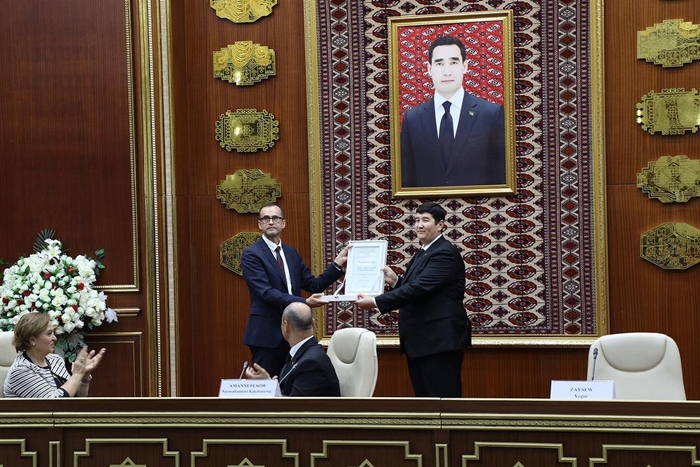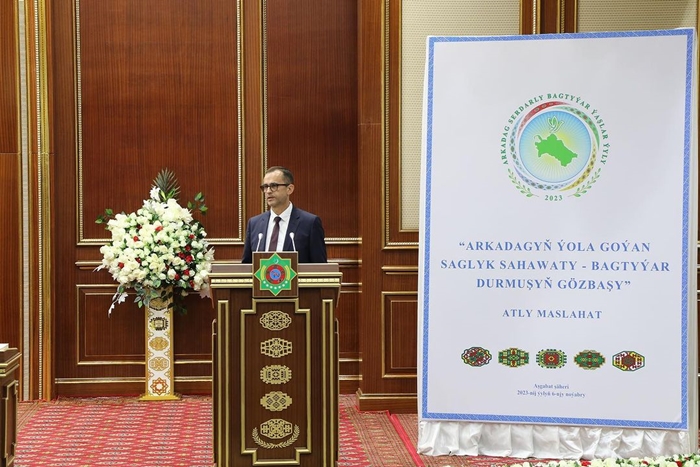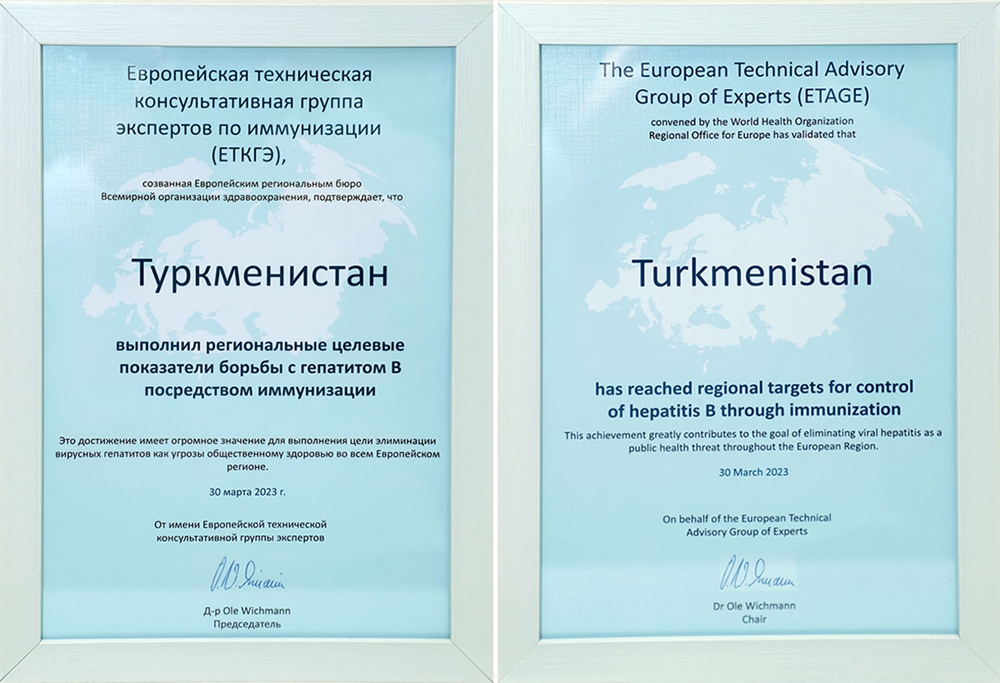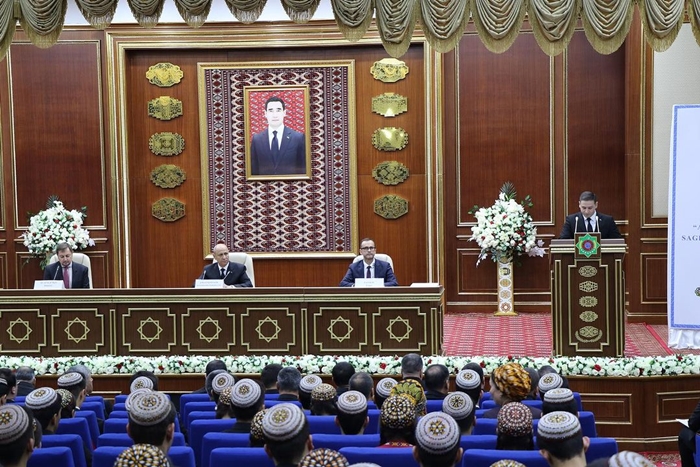 Turkmenistan has received a Certificate confirming its achievement of the regional goals for combating hepatitis B set out in the Action Plan for the Health Sector Response to Viral Hepatitis in the WHO European Region.
Turkmenistan has received a Certificate confirming its achievement of the regional goals for combating hepatitis B set out in the Action Plan for the Health Sector Response to Viral Hepatitis in the WHO European Region.
The document was issued by the European Technical Advisory Group of Experts on Immunization (ETAGE), convened by the Regional Office for Europe of the World Health Organization (WHO).
This Certificate confirms that Turkmenistan has met the regional targets for combating hepatitis B through immunization. The document notes that this achievement greatly contributes to the goal of eliminating viral hepatitis as a public health threat throughout the European region.
On Monday, 6 November, the WHO representative in Turkmenistan, Egor Zaitsev, presented a certificate to the Minister of Health and Medical Industry of Turkmenistan Atageldy Germanov during the conference “Arkadagyň ýola goýan saglyk sahabaty – bagtyýar durmuşyň gözbaşy” (Health safety created by Arkadag is the basis of a happy life), held at the Myrat Garryev State Medical University.
“This achievement is a contribution of Turkmenistan to the global goal to eliminate viral hepatitis as a public health threat until 2030,” the WHO office in Turkmenistan notes.
The forum was attended by Deputy Prime Minister for Health Nurmuhammet Amannepesov, UN Resident Coordinator in Turkmenistan Dmitry Shlapachenko, heads of UN missions in Turkmenistan, management and teaching staff of the university, medical specialists, representatives of students.
It should be noted that Turkmenistan, WHO and UN agencies have accumulated significant positive experience of cooperation in the implementation of a number of joint projects and programs in various priority areas of national health.
“The presentation of this certificate proves that together we can effectively fight infectious diseases and provide citizens with the necessary protection. In this regard, I would like to note the role of the World Health Organization (WHO), UNICEF and the United Nations Development Program in Turkmenistan. Cooperation with these UN agencies in the field of vaccination and immunization is one of the key success factors, as they provide expert support, train medical personnel and provide access to global vaccination resources. This helped Turkmenistan to develop and implement effective immunization programs, maintain a high vaccination coverage of children under one year old at the level of 96-98% of 14 vaccine-controlled infections according to the national vaccination calendar, which ultimately led to the achievement of regional targets for combating hepatitis B,” commented the UN Resident Coordinator in Turkmenistan Dmitry Shlapachenko in an interview with the newspaper “Neutral Turkmenistan.
“Turkmenistan has been carrying out universal vaccination of newborns against hepatitis B since 2002 and consistently maintains high rates of vaccination coverage against hepatitis B. In addition, representatives of risk groups and medical workers are vaccinated in your country.
 In 2022, a nationwide serological study on hepatitis B was conducted in Turkmenistan, which showed that the vaccination program ensured the elimination of chronic hepatitis B among children aged 10 to 11 years: the detection rate of hepatitis B virus surface antigen in this age group was 0.1%. Turkmenistan’s experience in successfully implementing a vaccination program against viral hepatitis B and assessing its impact is very important for other countries. The World Health Organization is ready to continue to support the Government of Turkmenistan in maintaining high vaccination coverage and ensuring effective prevention of perinatal transmission of hepatitis B in the future”, said WHO Representative in Turkmenistan Egor Zaitsev.
In 2022, a nationwide serological study on hepatitis B was conducted in Turkmenistan, which showed that the vaccination program ensured the elimination of chronic hepatitis B among children aged 10 to 11 years: the detection rate of hepatitis B virus surface antigen in this age group was 0.1%. Turkmenistan’s experience in successfully implementing a vaccination program against viral hepatitis B and assessing its impact is very important for other countries. The World Health Organization is ready to continue to support the Government of Turkmenistan in maintaining high vaccination coverage and ensuring effective prevention of perinatal transmission of hepatitis B in the future”, said WHO Representative in Turkmenistan Egor Zaitsev.
“In 2001, UNICEF supported the introduction of hepatitis B vaccination in the country. Since 2006, the Government of Turkmenistan has moved to 100% financing of vaccine procurement using the UNICEF Procurement Service. Until now, high-quality inexpensive vaccines that have been pre-qualified by WHO and safe injection equipment are being procured at the expense of public funds. This made it possible to find logistical opportunities to ensure the supply of vaccines and sufficient stocks even during the COVID-19 pandemic. Turkmenistan is an example of best practice in the field of sustainable vaccination financing. All children should have equal access to quality immunization services regardless of the social or economic conditions of society or their place of residence,” said Mohammad Fayyazi, UNICEF Representative in Turkmenistan.
The fruitfulness of this cooperation and Turkmenistan’s achievements in providing public health is evidenced by international certificates, recognizing the elimination of dracunculosis, the elimination of polio, as well as international awards on universal salt iodization, elimination of malaria, for leadership in the fortification of flour with iron and folic acid, a certificate confirming its status as a country free from measles and rubella. ///nCa, 7 November 2023 [Photo credit – TDH, WHO Turkmenistan]
#health_care, #Turkmenistan, #UN, #WHO, #UNICEF

